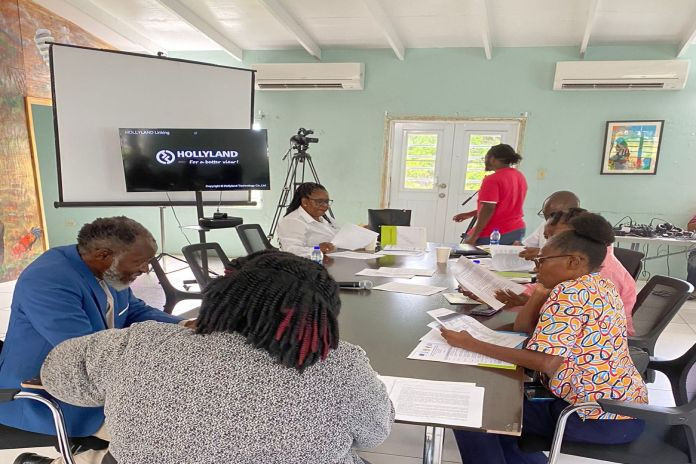– Validation of the National Agricultural Health and Food Safety Policy
BARBADOS / ANTIGUA – Recognising the importance of having a strong policy framework to modernise their Agricultural Health and Food Safety (AHFS) systems, Antigua and Barbuda successfully validated a National AHFS Policy and Action Plan under the European Union funded 11th European Development Fund Sanitary and Phytosanitary Measures Project (11th EDF SPS Measures Project).
The policy is expected to contribute to the attainment of the appropriate level of human, plant, and animal health protection, as well as access to safe and nutritious food and optimum trade facilitation of agricultural and food products. It will also bolster the government of Antigua and Barbuda’s strategies towards further developing the domestic agricultural sector and exporting food products.
On 23 May 2023 the National AHFS Policy Validation Workshop took place in St John’s in Antigua and Barbuda. The event commenced with an opening ceremony during which key partners provided remarks.
The representative from the European Union, Mariana Arias, programme manager, European Union Delegation to Barbados, the Eastern Caribbean States, the OECS and CARICOM/CARIFORUM, stated at the Workshop’s Opening Session that a part of the European Union’s mandate is to increase trade with Antigua and Barbuda, and with the entire Caribbean.
Arias indicated that the EU wants more business relationships, more economic and people-to-people exchanges and, equally important, healthier people in the Caribbean and a healthier environment for animals and plants, which is why the EU is funding the 11th EDF SPS Measures Project.
Arias further stated that the environment and climate change are global concerns for everyone. This will also help in achieving the regional objective of reducing food imports by 25 percent by 2025.

The representative from IICA, Dr Janet Lawrence, Agricultural Health, Food Safety & Quality Specialist – Caribbean/11th EDF SPS Measures Project Manager, stated:
“Crucial component of the project is strengthening the SPS regulatory environment. Through this component, what we have done is supported countries in the Caribbean to update their legislation in animal health, plant health and food safety. We have also trained public sector professionals to coordinate SPS services effectively and efficiently. In collaboration with the Caribbean Agricultural Health and Food Safety Agency, CAHFSA, we have developed a regional agricultural health and food safety policy evaluation plan and a national policy framework.”
Arias stated that we must ensure that the policy becomes an actionable document where we can see the benefits of implementation.
Weighing in, Dr Gavin Peters, chief executive officer, CAHFSA, stated:
“This is a major accomplishment for Antigua and Barbuda as they are the first to have their national AHFS policy developed as part of the 11th EDF SPS Measures Project. This is an important milestone and step in building an efficient and effective SPS regime in the Caribbean region. We will take the lessons learned from this development as we move the process forward so that every country in the region will have their national agricultural health and food safety policy developed and implemented.”
We all have a role to play in national food security according to Gregory Bailey, director of agriculture, ministry of foreign affairs, agriculture, trade and Barbuda affairs:
“As a matter of fact, many times in small societies like ours we find ourselves playing multiple roles along the value chain. For example, some farmers and fishers may be processors themselves, who may also be involved in the supply of inputs, in scenarios such as this it becomes paramount that we understand our relative position within the related value chains and the potential effects our actions and inactions may have on national food safety whether it be at the national level, community level or the household level.”
E.P. Chet Greene, minister, ministry of foreign affairs, agriculture, trade and Barbuda affairs, through his video message, indicated:
“Contaminated food is responsible for an approximate 600 million cases of food-borne illnesses and about 420,000 deaths worldwide each year. Food can be contaminated due to a variety of factors, including bacteria, viruses, parasites, chemical contaminants, and toxins produced by micro-organisms. In addition to the impact on human health, the recall of contaminated food can have significant economic consequences for crop and livestock farmers, as well as those who market their produce. The negative publicity surrounding recall can also damage the reputation of a marketer and/or a brand, leading to a loss of consumer trust and confidence, and reduced sales in the future.”
Minister Greene stated:
“It is essential to have strong policies and regulations in place to prevent and to respond to food-borne illnesses and in order to protect the health and well-being of consumers and the livelihoods of those involved in the food production and marketing chains. A policy on Agricultural Health and Food Safety can help to protect the health of consumers, livestock and crops.”
Why do SPS measures matter? More robust SPS regimes benefit countries by improving the health of national populations through the availability of safer food and reduced incidence of food-borne illness. The risk of the introduction of damaging plant pests and animal diseases would be reduced, resulting in less frequent harmful outbreaks. Strong SPS regimes would positively impact sustainable livelihoods in the agri-food sector and contribute to the food security of national populations through growth and development of the agricultural sector, increased trade and income for producers, and reductions in health and treatment costs from food-borne illnesses.
Additionally, this would make tourism-dependent economies, such as Antigua and Barbuda, a more attractive destination when safe food is provided to visitors.





